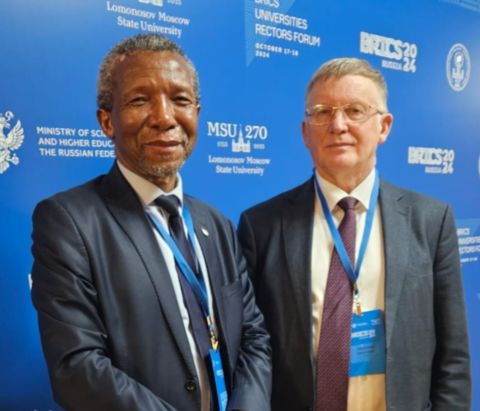Vice-President of the Russian Rectors’ Union, President of South Ural State University Aleksandr Shestakov took part in the BRICS Universities Rectors' Forum, held right before the meeting of the heads of the BRICS countries in Kazan.
Participants of the Rectors' Forum exchanged their experience and elaborated the strategies for collaboration. Aleksandr Shestakov shares his impressions from this big-scale event and talks about important decisions.
Brief profile by the Argumenty Nedely news media
For the period of 17 years Aleksandr Shestakov worked as the Rector of South Ural State University. Professor, Doctor of Science (Engineering) and Head of the Department of Information-measuring Equipment. Vice-President of the Russian Rectors’ Union. Head of the Council of University Rectors of the Ural Federal District. Member of the Presidium of the State Commission for Academic Degrees and Titles. President of the International Society of Instrument Engineers and Metrologists. Member of the General and Technical Councils of the International Measurement Confederation (IMEKO). Author of more than 260 published research papers and 13 inventions. Honoured Worker of Higher Education. Honorary Figure of Higher School. Among his many awards are medals of the Order "For Merit to the Fatherland" of the 1st and 2nd degree.
Strategic Tasks
– The international forum was held at Lomonosov Moscow State University (MSU). Among the event's participants were representatives of universities from Russia, Belarus, Iran, Egypt, China, India, Ethiopia, Brazil, and other countries. The simultaneous interpreting was offered in the Russian, English, Arabic, Chinese, Portuguese and Farsi languages.
President of the Russian Rectors’ Union, Rector of MSU Viktor Sadovnichiy acted as the chairman and moderator of the forum. After his welcoming speech and greeting of the guests of honour, an intensive two-day work began, within the frameworks of which informative reports were presented and section-specific sessions were held.
Strategically important tasks are set before rectors. We need to train new generations of specialists who will not only yield good scientific results, but will also be aware of their responsibility for the future of science and mankind. Certain initiatives were proposed, which aim at developing of education, science and technologies. Rectors expressed their confidence in the fact that by joining their efforts they can not only facilitate the implementation of important projects, but strengthen the positions of universities in the international scientific-and-educational space as well.
The BRICS Universities Rectors' Forum is a vivid confirmation of the fact that the actions of the West aimed at isolation of Russia have not succeeded. Collaboration with foreign partners in the fields of education and science is developing dynamically. Great plans have been made, which will need to be jointly put to life. By the way, I came to the same conclusion at the IMEKO World Congress held in Hamburg late in August, where I was the only representative of Russia.
Aerospace engineering, digital industry, artificial intelligence – these and other topical fields are being successfully developed in the universities in African and Arab countries. High-level professionals work at universities in Iran, Arab Emirates, Republic of South Africa, and other countries. Government authorities of the BRICS countries, Arab and African countries pay much attention to university funding. SUSU plans on strengthening its positions at the international level. I feel confident that the vector of development must be directed towards this partnership.
We aim at the research collaboration with universities from the BRICS countries. In addition, the Russian-African Network University is being actively developed at present. Currently, we are working on joining this educational project and offering the unique competences that SUSU has.
The task of the consortium is to improve the competitiveness and quality of the educational services. Today the agenda for the Russian-African Network University for the coming years is being formed. Our university is holding leading positions in many areas, so I believe that such interaction can bring good results.
Promising Collaboration
– What other novelties will be introduced at South Ural State University?
– We need to raise the level of our publications – "heralds" of SUSU. Publication collaboration is very important since it results in new topics for joint research. Such interaction will facilitate the fulfilment of international projects that receive funding.
The scientific and academic collaboration between universities is quite promising. I believe that many things here will depend on the contribution of each university into the joint activity. Our nearest task is to establish closer ties with foreign scientific groups and find common points of growth.
– As part of the Intelligent Manufacturing strategic project, SUSU pays much attention to research in the fields of neural networks and machine learning. Among the important points in the BRICS agenda is the joining the code of ethics in the field of artificial intelligence by the member countries. What does this code imply?
– In the field of artificial intelligence our efforts are aimed at improving of technological processes. First and foremost, we are talking about the evaluation of the state of equipment using the methods of machine learning. A number of developments by our scientists have already been implemented in metallurgical production. We strive to further improve the level of our research and aim at publishing our papers in the leading scientific editions.
Artificial intelligence requires to set serious tasks. It is no surprise that the code of ethics implies compliance with the law, human-oriented features, information security and, of course, the interaction and joining of our efforts.
The willingness to collaborate is very important, as well as the constructive approach of universities from the BRICS countries, African and Arab countries to the multi-vector joint work, which has great potential. I feel confident that everyone will benefit from this collaboration.




